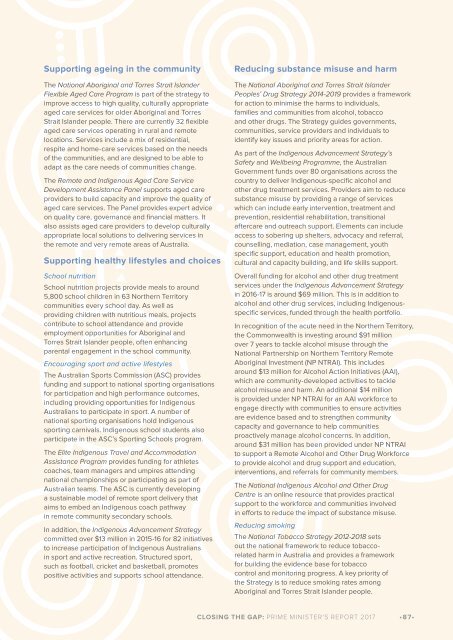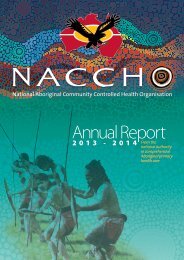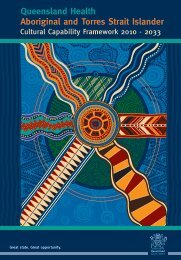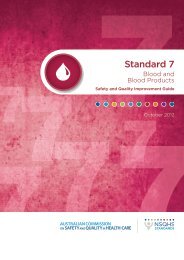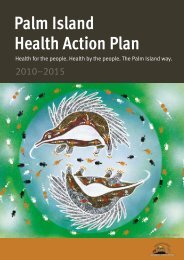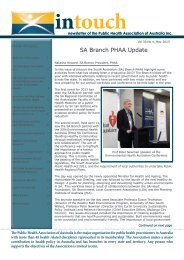CLOSING THE GAP
ctg-report-2017
ctg-report-2017
You also want an ePaper? Increase the reach of your titles
YUMPU automatically turns print PDFs into web optimized ePapers that Google loves.
Supporting ageing in the community<br />
The National Aboriginal and Torres Strait Islander<br />
Flexible Aged Care Program is part of the strategy to<br />
improve access to high quality, culturally appropriate<br />
aged care services for older Aboriginal and Torres<br />
Strait Islander people. There are currently 32 flexible<br />
aged care services operating in rural and remote<br />
locations. Services include a mix of residential,<br />
respite and home-care services based on the needs<br />
of the communities, and are designed to be able to<br />
adapt as the care needs of communities change.<br />
The Remote and Indigenous Aged Care Service<br />
Development Assistance Panel supports aged care<br />
providers to build capacity and improve the quality of<br />
aged care services. The Panel provides expert advice<br />
on quality care, governance and financial matters. It<br />
also assists aged care providers to develop culturally<br />
appropriate local solutions to delivering services in<br />
the remote and very remote areas of Australia.<br />
Supporting healthy lifestyles and choices<br />
School nutrition<br />
School nutrition projects provide meals to around<br />
5,800 school children in 63 Northern Territory<br />
communities every school day. As well as<br />
providing children with nutritious meals, projects<br />
contribute to school attendance and provide<br />
employment opportunities for Aboriginal and<br />
Torres Strait Islander people, often enhancing<br />
parental engagement in the school community.<br />
Encouraging sport and active lifestyles<br />
The Australian Sports Commission (ASC) provides<br />
funding and support to national sporting organisations<br />
for participation and high performance outcomes,<br />
including providing opportunities for Indigenous<br />
Australians to participate in sport. A number of<br />
national sporting organisations hold Indigenous<br />
sporting carnivals. Indigenous school students also<br />
participate in the ASC’s Sporting Schools program.<br />
The Elite Indigenous Travel and Accommodation<br />
Assistance Program provides funding for athletes<br />
coaches, team managers and umpires attending<br />
national championships or participating as part of<br />
Australian teams. The ASC is currently developing<br />
a sustainable model of remote sport delivery that<br />
aims to embed an Indigenous coach pathway<br />
in remote community secondary schools.<br />
In addition, the Indigenous Advancement Strategy<br />
committed over $13 million in 2015-16 for 82 initiatives<br />
to increase participation of Indigenous Australians<br />
in sport and active recreation. Structured sport,<br />
such as football, cricket and basketball, promotes<br />
positive activities and supports school attendance.<br />
Reducing substance misuse and harm<br />
The National Aboriginal and Torres Strait Islander<br />
Peoples’ Drug Strategy 2014-2019 provides a framework<br />
for action to minimise the harms to individuals,<br />
families and communities from alcohol, tobacco<br />
and other drugs. The Strategy guides governments,<br />
communities, service providers and individuals to<br />
identify key issues and priority areas for action.<br />
As part of the Indigenous Advancement Strategy’s<br />
Safety and Wellbeing Programme, the Australian<br />
Government funds over 80 organisations across the<br />
country to deliver Indigenous-specific alcohol and<br />
other drug treatment services. Providers aim to reduce<br />
substance misuse by providing a range of services<br />
which can include early intervention, treatment and<br />
prevention, residential rehabilitation, transitional<br />
aftercare and outreach support. Elements can include<br />
access to sobering up shelters, advocacy and referral,<br />
counselling, mediation, case management, youth<br />
specific support, education and health promotion,<br />
cultural and capacity building, and life skills support.<br />
Overall funding for alcohol and other drug treatment<br />
services under the Indigenous Advancement Strategy<br />
in 2016-17 is around $69 million. This is in addition to<br />
alcohol and other drug services, including Indigenousspecific<br />
services, funded through the health portfolio.<br />
In recognition of the acute need in the Northern Territory,<br />
the Commonwealth is investing around $91 million<br />
over 7 years to tackle alcohol misuse through the<br />
National Partnership on Northern Territory Remote<br />
Aboriginal Investment (NP NTRAI). This includes<br />
around $13 million for Alcohol Action Initiatives (AAI),<br />
which are community-developed activities to tackle<br />
alcohol misuse and harm. An additional $14 million<br />
is provided under NP NTRAI for an AAI workforce to<br />
engage directly with communities to ensure activities<br />
are evidence based and to strengthen community<br />
capacity and governance to help communities<br />
proactively manage alcohol concerns. In addition,<br />
around $31 million has been provided under NP NTRAI<br />
to support a Remote Alcohol and Other Drug Workforce<br />
to provide alcohol and drug support and education,<br />
interventions, and referrals for community members.<br />
The National Indigenous Alcohol and Other Drug<br />
Centre is an online resource that provides practical<br />
support to the workforce and communities involved<br />
in efforts to reduce the impact of substance misuse.<br />
Reducing smoking<br />
The National Tobacco Strategy 2012-2018 sets<br />
out the national framework to reduce tobaccorelated<br />
harm in Australia and provides a framework<br />
for building the evidence base for tobacco<br />
control and monitoring progress. A key priority of<br />
the Strategy is to reduce smoking rates among<br />
Aboriginal and Torres Strait Islander people.<br />
<strong>CLOSING</strong> <strong>THE</strong> <strong>GAP</strong>: PRIME MINISTER'S REPORT 2017<br />
•87•


